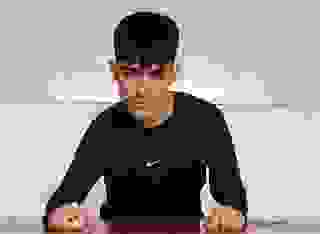- Gay Male
- Velvet Interrogation
Note: You can change font size, font face, and turn on dark mode by clicking the "A" icon tab in the Story Info Box.
You can temporarily switch back to a Classic Literotica® experience during our ongoing public Beta testing. Please consider leaving feedback on issues you experience or suggest improvements.
Click here[Note: In the world of espionage a "velvet interrogation" is one in which the subject doesn't know it's an interrogation at all.]
Chapter One: Chet
"I think the camps possibly seemed worse than they really were because I was in a cushy environment one day and then in the camps and then back to a cushy environment. I suppose for those in the camps it wasn't that much different from the conditions they had always faced. I wasn't in Saigon long in my previous assignment—but quite a bit longer than in the camps—and it was wall-to-wall tension the whole time I was in Saigon. That's what being in the camps was like for me, if not the residents of the camps, but worse, because each trip was bookended by life in the Paris of the Mideast—Beirut—which was then steeped in an atmosphere of false euphoria somewhat like Berlin had been before the outbreak of World War II. I had a lump in my throat the whole time I spent in the camps. Feeling like my mouth was full of cotton balls whenever I spoke. And trying not to let my voice quaver and reveal how I really felt."
"That's a fascinating observation. And on that first trip you made to the camps, you met Nabil?" Malcolm Moorhead asked, in his familiar voice. Familiar to millions of viewers, his weekly political interview show was one of the top-rated television programs in the States.
"Yes. Yes, we didn't fill all the seats with the people we had come to get. A lot wouldn't believe us and wouldn't leave."
"And that involves Nabil?"
"Yes." I sipped some water from the glass on the small table beside me, remembering that day. Still vivid after nearly twenty years. Grateful now that I was letting it all flow out of me—well, most of the story at least. I kept a large part of what Nabil was to me withheld. It was something that Malcolm Moorhead was interested in doing this interview for his show after all these years. It would be more interesting, but surely banned, if I told him the full story. And the full truth would mean disaster to Nabil. That was what I had to come to grips with before the interview: what I wanted for Nabil. This interview wasn't about me—wasn't to feed my vanity.
"I was not supposed to be there alone, but we were suddenly without the Marine who was supposed to drive the bus—and to back me up in case of trouble. On such short notice, I went alone that time because I knew how to drive the bus and we were under a time constraint—the Israelis had given us a very small window of opportunity—and there was no one else at hand who could go with me."
Moorhead sat across from me, cameras going, and him giving that welcoming, sympathetic look he so professionally had mastered.
"I had been driving one at home, in the States, before I took my first foreign assignment," I continued. "A church youth group bus. The call to go to the camps came in for this quick extraction trip into the camps, and my usual driver was off sick with stomach flu. So, either I went alone, or the mercy trip was canceled. I would have gone anyway. I determined who got on the bus. Now, however, it was just me, no one else to share the responsibility and the horror with me."
I realized I was repeating myself and talking in circles. I wanted to convey how much more terrifying it was to be doing this alone that time—which, I think went far in causing me to lower my guard where Nabil was concerned—but I was making a hash of this, so I just clamped my jaw shut and hoped that Moorhead would ask a question that moved me out of this failed attempt to make him and his viewers understand the full horror of what I'd experienced, and to mention the foundation on why Nabil meant so much to me.
"Nabil went with you or he was one of the passengers on the bus?" Moorhead was prompting me. I felt in a muddle and suddenly reluctant to talk about it. But here I was, and this was what I was supposed to talk about.
"He became one of the passengers on the bus."
"And when did you first see him?" Moorhead asked/
"Nabil?" I frowned and gathered my thoughts before resuming. "After a couple of hours I knew some of those on the list were never coming with me, so I began to say yes to anyone who looked like they could fill someone else's place. Similar age, gender, look. I had papers for every seat. There were quite a few young men who stood around looking at us. It got quite scary. They no doubt were combatants—the ones the Israelis wanted to neutralize. Ones who would cause me trouble at the checkpoints if I tried to get them through. But old people would queue up asking if I would take their sons, saying their sons had futures if they could only get out of the camps. How could I tell them that it was their sons who had brought the destruction down on the camps or that it was their sons who were the targets for what was to come? Then this young man turned up and said, 'Who would want to go with you? Who trusts you?'
"I was getting frustrated with no one believing me, but I told him why. I told him the Israelis had told us they would bomb the camps."
I stopped there, not wanting to delve deeper into this, damning myself for creating the opening. How could I tell a recording TV camera that—against all of my instincts to harden my heart to the young men milling around and looking threatening—I was attracted to Nabil from the start—by his striking good looks. His beauty, actually. Somewhat androgynous then, when he was not much more than a teenager. He would have been beautiful no matter what gender he was. That was then, of course. Later he grew in stature and commanding musculature and hardened up into a handsome, masculine man. Always the sort of engaging personality that served him well in what he has become. How could I tell Moorhead that I was immediately attracted to Nabil in a way that none of the other Palestinian refugees affected me—that, immediately, I was concerned for him; didn't want him to suffer what I knew was coming from the Israelis? What was coming especially to male youths his age.
I rushed on, protecting myself from what Moorhead could have asked that would open the Pandora's box of this interview.
"'Who believes the Israelis?' Nabil answered me. His tone was sarcastic, and for a moment I was afraid that he was egging on that muttering group of other men milling around outside the bus to start trouble. I told him that I did—I mean that we, at the U.S. embassy did.
"Nabil asked me why. And I told him that it was because the Israelis usually did what they say they would do. He looked at me for a moment; then he walked away from the bus. But as I was getting ready to leave, still with two empty seats, he came back with a backpack and said, 'I am going with you.' I wasn't sure I could get him past the checkpoints. I didn't have permission to take any young man—men his age were the targets of the Israeli action that was to come.
"I paused for a moment, but he repeated, insistently, 'I am going with you.' I grabbed his backpack and told him to open it. He looked at me as if he wouldn't; then he did, and it was just clothes. And some books, in English."
I paused here and looked at Moorhead, willing him not to ask if I remembered which English-language books Nabil was carrying. I certainly remembered one—Gore Vidal's The City and the Pillar, a story of the coming of age of a gay man—which caught my attention. I don't know if that was when I decided to take a chance on letting Nabil on the bus. Probably yes. But I certainly didn't want to tell Moorhead that.
Moorhead didn't ask and I continued. "So, I decided he didn't want to get on the bus to cause trouble. And I took a risk. I had papers to cover two young women. So, I looked around on the bus for a woman of his stature—Nabil wasn't tall, and he was thin. I had him dressed quickly in woman's clothes. Credit to the others on the bus, not one of them objected to my trying to save a young Palestinian man. My problem then was to move quickly so that they didn't start demanding that I try to save more of them. We managed to get through the checkpoints without any of the soldiers taking notice of him."
I expected Moorhead to pursue my motivation for taking such a risk for a young man, and I was prepared to say that I had the two empty seats, I wanted to save as many as possible, no one else was showing willingness to go, and it was time we had to leave, so at that point I was willing to do anything to save another life. But Moorhead just smiled at me and moved on with his questions.
"You reached Beirut." Moorhead asked in a low voice, almost a monotone. "Was that a difficult journey? And then what happened? Nabil wasn't on your original list, was he? So, you didn't know Nabil at all before that time. And yet your association with Nabil doesn't end there, does it? It's a long way from a refugee camp to the University of Virginia; to Washington, D.C.; and back to Lebanon. And here we have Nabil campaigning for the presidency in Lebanon—and very likely to win. So, this is a pivotal story in his rise to prominence, isn't it?"
This was the crux of the interview. The interview wasn't about me, really. The interest after all of these years was in Nabil Shalili, a rising star in Lebanese politics. And here I had his life and future in my hands. If I told Moorhead what I actually knew, it would blow the top off of Nabil's candidacy—and life. Or I could burnish his legend, help him. I had known this when I came into this interview. I knew Nabil was the center of the interest; I knew I held his life in my hands. So, I knew too where I would take the interview; I'd had time to review what Nabil meant to me—and to decide how to depict him to the public.
"Yes. It's a long way," I answered, brushing aside the invitation to say why I had taken this risk for Nabil. "In Beirut . . ." I sipped more water, this was the hard bit, I had no idea how much Malcolm knew. Or how much his researchers had dug up. I had come because Nabil had asked me to. He wanted me to, which surprised me. There were secrets that could hurt us both, and that could destroy him. But I'd already decided what I would say in this interview, what I would reveal and what I would hide for as long as possible, so I cleared my throat and continued.
"In Beirut he hung around, and his extended family got in touch. They wanted him to get to the States. I discovered he was smart, and as his parents had died when the camps were bombed, I was able to get him assistance to come here."
Lies. There had been a lot of them over the years. Nabil was building himself a plausible background from the first moment I met him. And even as he was getting on the bus in the camp, he was working on me. The truth of the matter, what I would not willingly reveal to Moorhead, was that, as soon as we arrived in Beirut, he was there beside me, smiling. And he had his hand on my arm, innocent, but not innocent with the look he had in his face, and what he said. "I would like to make you want to take me to America with you," he said quietly, as he pressed close and squeezed my arm.
I was forty-one and alone in Beirut, deliberately being celibate, and had no intention of getting tangled up with a refugee of unknown origins, however good looking and available he was. My divorce had hurt my career a few years before, and I was still too young to have lost my ambition for something better than I had.
"I must get to America and learn about you," he said. I thought he was being funny, or had some militant ambitions, so I was wary, but he didn't go away. There was a big gap in the story I could tell. How does a young Palestinian refugee with no family get to America? The rest—getting an expensive education and introductions in Washington—was easy in comparison.
"So, once Nabil had escaped the camp, he hung about in Beirut," the interviewer said, bringing me back from my momentary reverie. "Then what happened?"
"Yes. He hung about in Beirut, studying English and other languages, whatever he could, at the American University, and we kept in close touch. But I went home not many months after that," I said. "You see, I was injured in the U.S. embassy bombing of late '82, and my posting was cut short. I knew Nabil had potential and the ability to succeed. It was not easy to arrange. But as his parents had been killed, and he now had demonstrated valuable language skills, I managed to sponsor him to come here. I guaranteed to provide him with accommodation and support while he was studying languages further. I had a home in the country an hour's drive north of Charlottesville and contacts at the University of Virginia, which helped."
I had thought long and hard about what to say in the interview about this, so I was confident that I had delivered the half-truths glibly and convincingly. This wasn't the complete story, though. Not by a long shot.
* * * *
"Hung about" was one way to look at it. He had followed me home in Beirut that first night and met me when I got out of my taxi and refused to leave, and when I opened my door, he had pushed in and forced me to the wall. We kissed. He was forceful, pushing me back to the wall, pressing against me hard, grinding his crotch into mine so I could feel how hard and big he was. I had been avoiding any kind of sex since I arrived in Beirut and that was all it took to turn my dick back on. He took control of me—and never lost it all the time we were together.
When he could feel that I was hardening up, he unzipped me, kissing lightly down from my mouth to my throat, then along my collar bone and brushing his lips expertly over my chest while he unzipped my pants. He pushed them down as he dropped to his knees before me. I was too stunned by the speed of it, and then too aroused, to make him leave.
He briefly ran his tongue along the length of my now-straining cock and cupped my balls. He was there to stay. He gave good head, a surprise, as I had heard Arab men rarely would. But he certainly did. When I was hard and beginning to move his head about to increase my pleasure, he pushed my hands off and stood up.
* * * *
"Did you know then when you first sponsored him, what Nabil planned to do with his life?" Malcolm asked, breaking into my memories.
"Do? No. Not really in the beginning. He said he needed an education, and that it was what his family had wanted, and I thought he was smart enough and determined enough to succeed at whatever he put his mind too. He said he needed to understand what made America a great power. But I had no idea what he planned to do with his life. I asked him, but he was reluctant to talk about it."
* * * *
"Determined" summed Nabil up. From having his mouth on my cock, he made his way into my bed. I hadn't had a man inside me for so long. I cried out at the hardness and thickness of him as he entered me, taking command, holding my wrists over my head, and thrusting, thrusting, thrusting, deep into the soft core of me, not relenting as I churned my hips with the rhythm he set, until we had both come, first me and then him.
By the end of that first night he had moved in. He fucked with experience and passion. He wasn't a novice to sex with a man. He gave me more than I had ever known I wanted. He was also discreet. But if I had known then what he would do to my life I have no idea what I would have done next, after that one night when he gave me the sexual satiation I had gone so long without.
Chapter Two: Nabil
I willed Chet to be careful. If I had thought there was any chance that he knew the truth, I would have thought of some other way. But all this time he never mentioned it to me. Eighteen years without a suggestion of what was really happening—of who I really was, why I really had done what I did. I long ago admitted to him that I was older than he originally thought—and that actually relieved him. I think that was harmless enough. If they suspected he wasn't being forthcoming, I hope it was that guilty secret that he came up with. Something to make him feel guilty, but nothing that he was truly guilty of—and a false lead that would give them some minor guilt to gnaw on that had nothing to do with what they might kill him for knowing.
But I didn't really want him to reveal his true motivation for having taken me out of the camps either. Or how I used him thereafter.
"He's very good, this Malcolm Moorhead." The voice came from the small man standing beside me. A grandfatherly looking man, seemingly harmless. But I knew he wasn't harmless. I knew that he held sway over my life as well as that of Charles Bender—the man I knew as Chet—in the room on the other side of the two-way mirror, the interview room. The interrogation room.
I knew that the first impulse of this coldblooded man, who had once told me—believably—that he would cut out my liver if I ever kept secrets from him, was just to eliminate Chet. I knew that he had only been deterred from that because I told him I was positive Chet knew nothing of the operation and that killing a former U.S. diplomat who had been in Beirut and who knew me perhaps wasn't the best thing to do right at the moment. Not as delicate as my position in the Lebanese parliament and the sway of my political campaign was. It was no secret that I knew Charles Bender and that he had been instrumental in bringing me to the States all those years ago. No one need know why Chet brought me to the States, what weakness in him permitted me to move him to take me to the States.
"Yes, Moorhead is good," I answered. "It was a nice touch to bring in a well-known TV commentator rather than one of your own men—and making him think this was a TV interview—making this a mock interview rather than an interrogation. I don't think Bender will see the threat in this. I think you'll get honest, straightforward answers and it will set your mind at ease about what he knows—that he won't be a threat to us."
What I was thinking, though, was a mix of thoughts. First, and foremost, I was relieved that Moorhead hadn't pursued the question of why Chet had taken the risk of letting me on the bus—that it was physical attraction—that I had discerned what his attraction to me was and had used it to my advantage. If Moorhead had followed up on that, the whole story might have unraveled. So, Moorhead wasn't quite as good as Joseph thought. And I wasn't sweating inside my suit as much as I had been before the interview. Second, I was thinking that it was more than a nice touch to bring Moorhead in. Moorhead was deeply planted; Joseph was showing his intent by bringing him in, exposing him to any possible connection with our cause. If Chet left the interview room alive now, it would be because both he and I had put on the performances of our lives.
"We'll see." That's all Joseph would say to my declaration that Chet wouldn't be a threat to us. That we'd see.
Chet didn't deserve this. He didn't know anything that would compromise the operation. Did he?
He certainly didn't know I was here, just across the false mirror from him. He thought I was in Beirut, running for the presidency there. He had no idea I had interceded on his behalf and had flown secretly to Washington, that if I hadn't insisted, there wouldn't have been even this interview, this chance to show that he knew nothing compromising. That he deserved to live.
I was trying not to show that I was sweating. I couldn't let Joseph see that I was worried. I had to show every sign of confidence that Bender would say nothing compromising.
I hadn't said or done anything that first day in the camps or later in Beirut. I'm sure I hadn't. And even if I'd let some hint drop, I didn't remember it now. So, surely Chet wouldn't remember it across all these years either.
Would he?
Chapter Three: Nabil
Chet had whispered the knowledge to me—quietly, as if I was dragging it out, as if it was the last resort he had to convince me that the Israelis were going to bomb the camps, that the bus he was trying to fill was the last chance at life for whoever occupied the seats.








